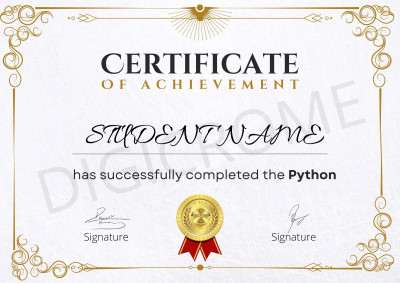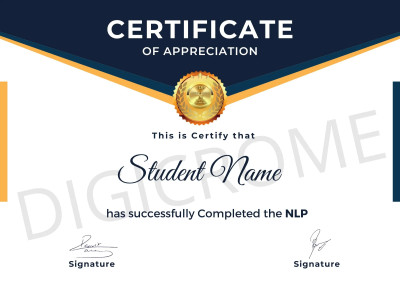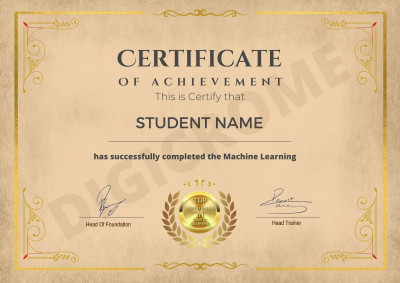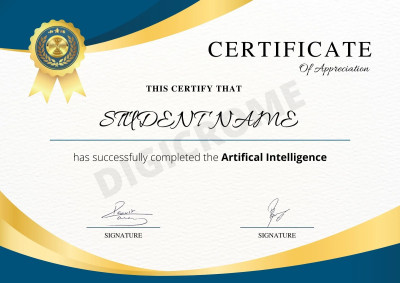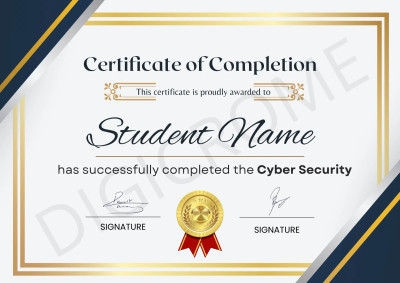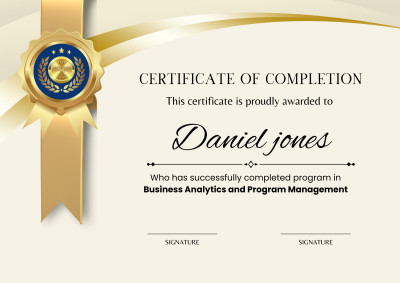Program Overview
In today's technology-driven world, businesses and institutions heavily rely on technology for various operations. However, this dependence also exposes them to cyber threats from malicious entities seeking to disrupt their functioning. To combat these threats, professionals trained in cybersecurity are in high demand. Dive into the world of cybersecurity with Digicrome's Masters in Cyber Security certification course.
Why Masters in Cyber Security?
- Detect, identify, and mitigate cyber risks effectively.
- Strategize and design comprehensive cybersecurity roadmaps.
- Assess and enhance the cybersecurity posture of enterprises.
- Conduct thorough cybersecurity audits and investigations.
- Establish a cyber-safe IT and OT environment compliant with legal and regulatory requirements.
Required Skills:
- Initiative and personal responsibility.
- Decision-making in complex situations.
- Learning agility for continuous skill development.
Course Essentials:
- Bachelor's degree with minimum 50% marks.
- Minimum 2 years of work experience.
- Basic understanding of programming and networking concepts.
Learning Objectives:
- Grasp information and risk concepts.
- Identify and mitigate cyber threats and attacks.
- Understand cybersecurity architecture and operations.
- Implement secure systems and products.
- Manage cybersecurity effectively within an organization.
Course Enables:
- Categorize and select controls based on risk assessment.
- Implement technical controls like cryptography and access management.
- Utilize forensics and investigations to manage incidents.
- Gain hands-on experience through practical projects.
Course Highlights:
- Learn from renowned cybersecurity instructors.
- Real-life use cases to demonstrate concepts.
- Flexibility to learn at your own pace.
- Globally recognized certification upon completion.
- Placement assistance is provided by industry experts.
Course Structure:
- 06-month program with rich, professional content.
- Weekly doubt-clearing sessions to enhance learning.
- Official assessments after each module.
- Practical projects for hands-on application of concepts.
Career Scopes:
- Chief Information Security Officer.
- Forensic Computer Analyst.
- Information Security Analyst.
- Penetration Tester.
- Security Architect.
- IT Security Engineer.
- Security Systems Administrator.
- IT Security Consultant.
Embrace the challenges and opportunities in cybersecurity with Digicrome's Master in Cyber Security certification course. Propel your career forward and become a sought-after cybersecurity professional in today's digital landscape. Enroll now and secure your future in cybersecurity.
Masters In Cyber Security
- ₹70000.00
Features
- 06 Months
- Live Online
- Student Handouts
- Industrial Projects
Key Highlights
 06 Months
06 Months Live Online
Live Online Student Handouts
Student Handouts
 Industrial Projects
Industrial Projects
 Expert Experienced Trainers
Expert Experienced Trainers
 1:1 Doubt Session
1:1 Doubt Session
 Learning Management System
Learning Management System
 24*7 Career Support
24*7 Career Support
Program Objective
- Cyber Laws
- Introduction to Computers
- Computer History
- Software & Hardware
- Classification of Computer
- Input-Output Devices
- Windows
- DOS Prompt Commands. Linux/Mac Terminal and Commands
- Basic Computer Terminology
- Computer Security models
- Computer Security terms & Ethics
- Business and Professional Ethics
- Need for cyber security
- Cyber Frauds and crimes
- Digital Digital Payments
- Various Search Engines
- Introduction to Auditing
- Deep Web
- VAPT
- Smartphone Operating systems
- Introduction to compliances
- Globalization and border less world
- Need for Cyber Regulations;
- Scope and Significance of Cyber laws : Information Technology Act 2000;
- Network and Network Security,
- Access and Unauthorized Access,
- Data Security,
- E Contracts and E Forms
- Penal Provisions for Phishing,
- Spam,
- Virus,
- Worms,
- Malware,
- Hacking,
- Trespass and Stalking;
- Human rights in cyberspace,
- International C International Co-operation in investigating
- Cyber crimes
- Types of networks,
- IP Address,
- NAT ,
- IP Subnets,
- DHCP Server,
- Ports,
- DNS,
- Proxy Servers,
- Virtual Private Networks,
- DNS Server,
- OSI and TCP IP Model,
- Routers ,
- Switches,
- Endpoint
- Solutions,
- Access Directory,
- TOR Network.
- Networking Devices (Layer1,2,3) -Different types
- of network layer attacks – Firewall (ACL, Packet
- Filtering, DMZ,Alerts and Audit Trails) – IDS,
- IPS and its types (Signature based,
- Anomaly based,
- Policy based, Honeypot based)
- VPN and its types –Tunneling Protocols – Tunnel and Transport Mode – Authentication Header Encapsulation Security Payload (ESP)- IPSEC Protocol Suite – IKE PHASE 1, II – Generic Routing Encapsulation (GRE).
- Implementation of VPNs
- Network Sniffing
- Wireshark
- Packet analysis
- Display and capture filters
- Ettercap
- DNS
- Poisoning
- ARP Poisoning
- Denial of services
- Vulnerability scanning
- Nessus
- Network
- Policies
- Open VAS
- Sparta
- Network Scanning Report Generation
- System hardening.
- Secure system configurations.
- SSL Striping.
- Setup network IDS/IPS.
- Router attacks.
- VPN Pentesting.
- VOIP Pentesting
- Network Exploitation OS Detection in network,
- Nmap, open ports,
- Filtered ports,
- Virtual Private Networks
- Network Attacks Part 1
- Service detection,
- Metasploit framework,
- Interface of metasploit framework,
- Network vulnerability
- Assessment,
- Evade anti viruses and firewalls,
- Metasploit scriptin Metasploit scripting,
- Exploits,
- Vulnerabilities,
- Payloads,
- Custom payloads,
- Nmap configuration,
- Social Engineering toolkit,
- Xero sploit
- Framework,
- Exploits delivery.
- End Point Security
- Protocols,
- MAC Filtering,
- Packet Encryption,
- Packet Sniffing,
- Types of authentication,
- ARP
- Replay attack,
- Fake Authentication Attack,
- De authentication,
- Attacks on WEP ,
- WPA andWPA-2 Encryption,
- Fake hotspots,
- Evil twin attack,
- Fluxion framework
- Encoding: Char set
- ASCII
- UNICODE
- URL Encoding
- Base64
- Illustration: ISBN/ QR Code/Barcode
- Binary hamming codes and Binary Binary hamming codes and Binary Reed muller codes
- HTML Basics,
- XAMPP Server Setup,
- Hosting Websites Linux,
- Apache,
- Virtualization,
- Server
- Configurations,
- Web Application Firewalls
- Basics of Networking
- Introduction to Cyber Security.
- Information Gathering.
- Physical Security
- Windows-10 Analysis & Hacking
- Google Hacking
- Application Password Hacking
- Reverse Engineering & Software Cracking Techniques
- Email Hacking & Tracing.
- Malware Attacks, Backdoors & Handheld Devices Analysis.
- Encoding
- Web Application Architecture
- Cyber Security & Ethical Hacking
- Application Attacks
- Network Attacks
- DoS, DDoS & Buffer Overflow Attacks
- Network Packet Analysis & Sniffing
- Spamming
- Firewall Technologies.
- IDS, IPS & Honeypots Analysis.
- Hacking Routers, Cable Modems and Firewall.
- Cryptography with different Applications.
- Message authentication code and Hash Functions
- Public Key Cryptography and Bitcoin
- Secret Key Cryptography
- Internet Content Filtering Techniques
- Securing Gadgets
- Introduction to ISO 27001 & Security Policies
- Disaster Recovery & Planning
- Information Technology Amendments Act 2008
- Case Studies & Hacking News
- PC Auditing & Virus Analysis
- Corporate & Economic Espionage
- Web Application Vulnerabilities
- Session Hijacking & SQL Injection
- Phishing & Financial Frauds
- Security Protocols
- Linux Hacking
- Hacking Wireless Networks
- Exploit Analysis
- Network & Web Audits
- Data Acquisition & Forensics Data Recovery
- Operating System Forensics
- Cloud Forensics
- Hacking Mobile Phones, PDA & its Countermeasures
- Cyber Crime Investigation
- Cyber Warfare, Terrorism & Social Networking
- Cyber Forensics and Incident Handling
- Case Study
- Group Presentation
Our Certificates
Certified by









